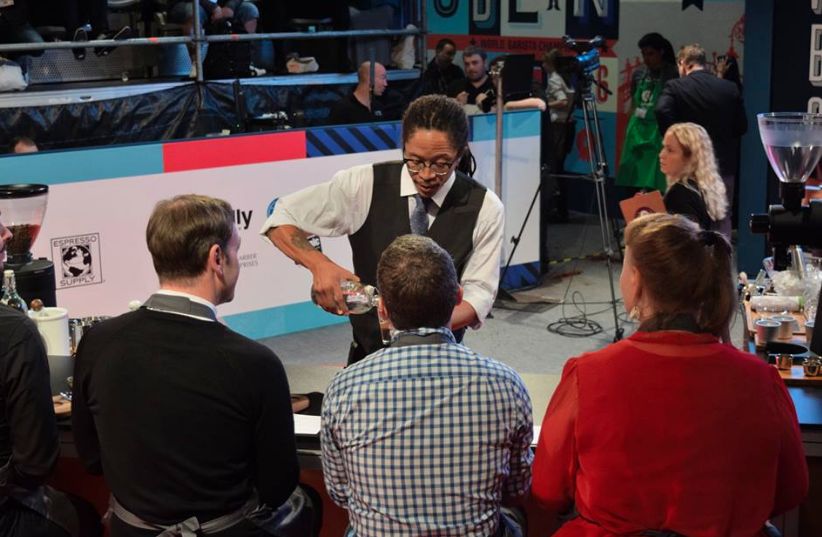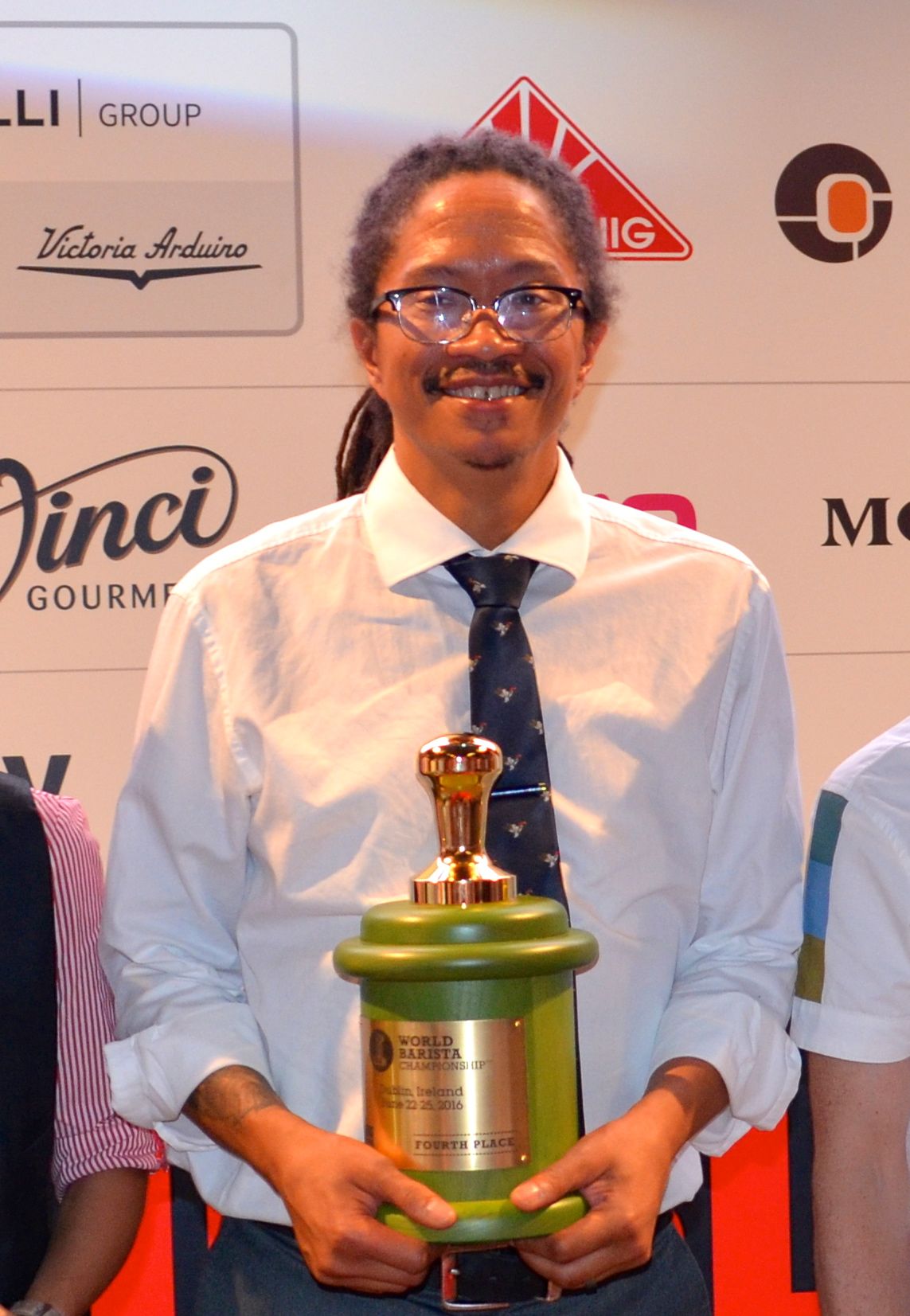What drew you to the competition? Why did you start to compete and what is it that kept you coming back?
When I was working for a local cafe, 6 months into the job my co-worker asked if I would come out to support him at a barista competition. I thought he was joking, but after some convincing, I attended the very first South East Regional Barista Competition in 2004. I was really amazed at the competition. It was a whirlwind of coffee, coffee professionals, music, three espresso stations with judges! I knew the moment I first saw this coffee spectacle that I had to compete; I had to be a part of the energy. I had no idea what went into preparing for this level of excellence, I just did it. and performed horribly my first time. Out of 25 competitors, I placed 23rd. Performing so poorly made me realize that there was more to being a competitive barista than I thought and this forced me to work hard at understanding the rules, the scoresheets and more importantly the coffee. After a year of working harder at my craft, I competed for a second time and placed first in the SouthEast Regional Barista Championship. Winning on a regional level opened a door into the specialty coffee industry; an industry I did not know existed until I started competing. It was then that I realized I wanted to begin a career in coffee.
How did you go about selecting your beautiful coffee?
When selecting a coffee for competition, I look for a coffee farmer who is excited about quality because it will show in the coffee and that makes the competition presentation flow in a fun way. I then start with the coffee's volatile compounds (aromatics and brightness) and then the coffee's sweetness. Roasting will be important in balancing out these characteristics as the coffee is extracted under pressure from the espresso machine. The careful manipulation of variables on the farm level, roast level and barista level directly impacts the coffee experience. Jose Gallardo's gesha variety from Panama exhibited an amazing flavor profile and Jose's story is incredible.
When was the first time you went to a coffee farm?
After winning the first SouthEast Regional Competition, I was invited to Nicaragua by Counter Culture Coffee (who was our cafe's roaster at the time). It was during this first coffee origin visit that the excitement I had for coffee was put into context. I learned about direct trade relationships, coffee farming, coffee processing and the dedication to quality coffee farmers in Nicaragua had for their product. I realized later that it is necessary for any coffee professional to make a trip to a coffee producing country to gain a true understanding of coffee that can not be gained in a classroom setting or in a cafe.
 Did you have sponsors that helped to support your attempt to win the World Title?
Did you have sponsors that helped to support your attempt to win the World Title?
I would not have been able to compete if it weren't for sponsorship on so many levels.
Counter Culture Coffee has always been a major sponsor from the beginning in 2005 and they continued sponsorship each time I've competed all the way to the 2016 WBC; coffee, practice space and travel adds up and can become an economic burden without sponsorship. I am an URNEX Ambassador for a year and this sponsorship alleviated a lot of the economic burden on the road to Dublin. I've also relied on private sponsorship from friends in the industry as well as those who are not in the specialty coffee industry. After winning he 2016 United States Barista Championship, Jose Gallardo (the farmer who's coffee I used in competition) sponsored the green coffee for the 2016 World Barista Competition. Amazing!
How did you approach your performance speech?
I approach all my performance speeches like a thesis that I defend through a tasting experience.
How do you feel emotionally, at the end of your bid to be World Champ? Are you ready to be in the centre of the coffee world and what do you hope to do with this time?
I am still vibrating from the excitement from competing on a World Stage in Dublin, Ireland. It was an honor to represent my country's specialty coffee industry, a family coffee farm in Panama, an amazing roaster who has supported me for 13 years and an exceptional coffee that I milled and sample roasted with the farmer in Panama. Wow! I am ready to be in the center of the coffee world and use this time to help inspire as many people in the coffee industry as possible just like I was inspired and continue to be inspired by coffee professionals of yesterday and today. Through inspiration we can help uplift the specialty coffee industry internationally as well as in our local communities.
Why do you believe that the coffee competitions are so important?
We sell two things in our cafes: a quality product and quality customer service. The barista competition is all about a high quality product and high quality customer service. As we prepare for competition, we are preparing ourselves for excellent coffee professionalism. Striving for that excellence elevates our skill level as well as the industry. No we can't achieve perfection, but if we relentlessly pursue coffee perfection, no matter where we place on a quality scale it becomes a win for the coffee farmer, the cafe and the customer.
If you could identify one quality that you believe is integral to becoming a World Champion, what would it be?
Humility. When we are able to remove our egos and get out of coffee's way, we enhance the coffee experience.
Were there moments when you wondered if it was worth it?
I have two young children so the only time I had to prepare for competition this season was after 9pm. So each day from 9 pm to 1 am, I practiced and drank coffee. There were many times that I doubted my skills, my palate and thought of withdrawing from the United States Barista Competition. It was the many texts, emails and facebook messages from baristas I didn't know who said I inspired them to be baristas or inspired them to compete, that kept me focused on making it to the final round of the United States Barista Competition.
Who inspired you to reach this level?
Peter Giuliano is a big inspiration; Gary Horne of Mahlkonig USA; my wife who has been to every competition to support me; Cindy Ludviksen (my first coach); the many coffee farmers who have dedicated their lives to hard work to produce quality coffees and the working barista who grinds everyday pushing quality product and quality customer service, not because its their job but because of who they are.
Has life changed at home? Tell us about work at Counter Culture and how it inspires you everyday.
Life has changed a some. I am traveling a lot more. I make a lot of baristas nervous when I order coffee. Its flattering, but I'm still the same guy as before the "fame".
At Counter Culture Coffee I enjoy sharing what I know with cafes we work with. I enjoy tasting some of the best coffees in the world with a variety of coffee professionals. As we continue to pursue coffee excellence through our sourcing relationships, I am inspired by the way we put the relationship with producers first and our selves last. I try to approach coffee and baristas who seek my help in the same way.
.JPG) Are you going to compete again? Finals is huge, do you have ambitions to take it to Number 1?
Are you going to compete again? Finals is huge, do you have ambitions to take it to Number 1?
It would be an honor to be considered the best barista in the world. Compete again? I can't say that I will and I can't say that I won't.


.JPG)